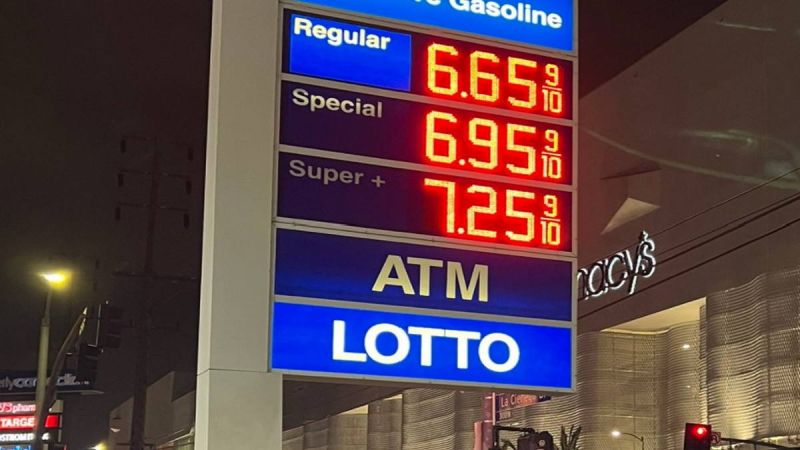Higher Gas Prices Benefits EV Companies Like Tesla
There's been some pictures of gas prices of 7 dollars in some places. The increase in price for oil and gas is a good thing for EV companies and it benefits Tesla the most. Let's see how.
First off, higher gas prices are going to hit the global economy and the average consumer who uses an internal combustion engine vehicle. The lower gas mileage the vehicle and the bigger it is, the bigger the hit will be. This is where an EV (electric vehicle) comes in.
Let's see what gas prices are in the United States across all 50 states. To do that, I visited AAA Gas Prices. I live in Utah and their price is about right for what I'm paying for my Honda Fit in Utah. And this is on the low end of the spectrum. The high end average gas price ranges from $5 to $6, with the ultra high end passing $7 per gallon.
So far, there is no indication that these gas prices are going to go down any time soon, especially with the Russia invasion of Ukraine and Russia's large supply of oil it sells. Thankfully, I have a Model 3 RWD on order and this will help curb my gas spending. But I already drive a light weight car that gets good gas mileage, I'll save about $75 to $100 a month on gas. Others will save a lot more.
Savings From Using an EV Like Tesla
To calculate savings, I'll simply take the cost per mile to use a Tesla supercharger and I will then take the cost per mile of gasoline. I'll use several vehicles as an example including my own Honda Fit, as well as a Tesla Model 3 RWD (the least expensive Tesla) to see what the savings are from using an EV - and in this case, a Tesla.
Honda Fit (10.6 gallons - 30 mpg)
Jeep Wrangler (21.5 gallons - 20 mpg)
Ford F-150 (26.0 gallons - 20 mpg)
Tesla Model 3 RWD (272 EPA range)
The rough average cost to charge a Tesla Model 3 RWD is about $8. The average cost of gas per gallon is about $3.84 right now. If the average driver drives 10,000 miles in a year, here's what the savings look like:
Cost per mile just for gas for each vehicle:
Honda Fit: 318 miles per tank of gas using the mpg, and a cost of $3.84 * 10.6, which is $40.70 to fill up a tank of gas. That means the vehicle will fill up about 31.45 times per year. If you multiply that by the cost to fill up the tank, $40.70, you get 31.45 * $40.70, which is $1,280 per year or about $100 per month. That gives us a cost per mile of 12.8 cents. Just for gas. Not bad actually.
Jeep Wrangler: 430 miles per tank of gas using the mpg, and a cost of $3.84 * 21.5, which is $82.56 to fill up a tank of gas. That means the vehicle will fill up about 23.26 times per year. If you multiply that by the cost to fill up the tank, $82.56, you get 23.26 * $82.56, which is $1,920 per year. That's a little more expensive at almost $2,000 or $167 a month.
Ford F-150: 520 miles per tank of gas using the mpg, and a cost of $3.84 * 26, which is $100 to fill up a tank of gas. That means the vehicle will fill up about 19.23 times per year. If you multiply that by the cost to fill up the tank, $100, you get 19.23 * $100, which is $1,923 per year. That's on par with the Jeep Wrangler and about $167 a month as well.
Tesla Model 3 RWD: 272 miles of range on a charge and a cost of $8 to completely charge the vehicle. A Tesla Model 3 RWD with LFP batteries can also charge to 100%. We'll also assume that the car will not go below 10%, and factor in some cold weather, so we'll put the actual range at 240 miles. That means the car will charge 41.67 times per year - just over once a week.
Increasing Gas Prices Means More Savings for EVs
Now, there are places where you can charge for free where I live. My grocery store in Utah, Harmons, has free electric vehicle charging for customers and I plan on using this. But I'm going to just assume everyone has to use a supercharger just for simplicity. Home charging is a little less expensive...
With 41.67 times per year being charged (at 10,000 miles driven), multiplied by $8, you get $333 per year to charge the Model 3. Not bad at all, let's see the gas savings then:
Honda Fit: $1,280 - $333 = $947 of savings per year
Jeep Wrangler + Ford F-150: $1,920 - $333 = $1,587 of savings per year
If gas prices continue to go up, then the savings will keep getting higher. If you use a $7 a gallon cost, the vehicles yearly costs and savings look like this:
Honda Fit: $2,333 - $333 = $2,000 in savings per year
Jeep Wrangler + Ford F-150: $3,500 - $333 = $3,167 in savings per year
Already, I'm expecting to get a savings of around $1,000 per year by having my Model 3 RWD just for gas savings. That doesn't factor in less maintenance, oil changes, etc... We'll have to wait to see how that plays out. In conclusion, higher gas prices means more and more incentive to get an EV, and for me, a Tesla vehicle.
There has never been a better time to buy an EV! $7.25/gallon is INSANE. pic.twitter.com/Hhbs7Uhw92
— Zack (@BLKMDL3) March 4, 2022
Will gas prices continue to go higher? Is this a benefit to EV companies like Tesla?
Leave your comments below, share the article with friends and tweet it out to your followers.
Jeremy Johnson is a Tesla investor and supporter. He first invested in Tesla in 2017 after years of following Elon Musk and admiring his work ethic and intelligence. Since then, he's become a Tesla bull, covering anything about Tesla he can find, while also dabbling in other electric vehicle companies. Jeremy covers Tesla developments at Torque News. You can follow him on Twitter or LinkedIn to stay in touch and follow his Tesla news coverage on Torque News.
Set Torque News as Preferred Source on Google












Comments
It's a good point, and an
Permalink
It's a good point, and an interesting comparison. But the greater point is that the vast majority of today's EV owners simply charge up at home overnight for a tiny fraction of that cost. Off peak electricity costs vary, but in CA, where both electricity and gasoline are expensive, I pay 17 cents a kWh, or about $2 for 12kWh, which gets me 40 miles. If my car got 20MPG and gas is $6/gal, it works out to 30 cents a mile. Compared to 5 cents a mile for my electricity costs. Or currently 6 times as expensive to use gas compared to electricity from charging at home. I understand that not everyone can charge their EV at home, but millions of people can.